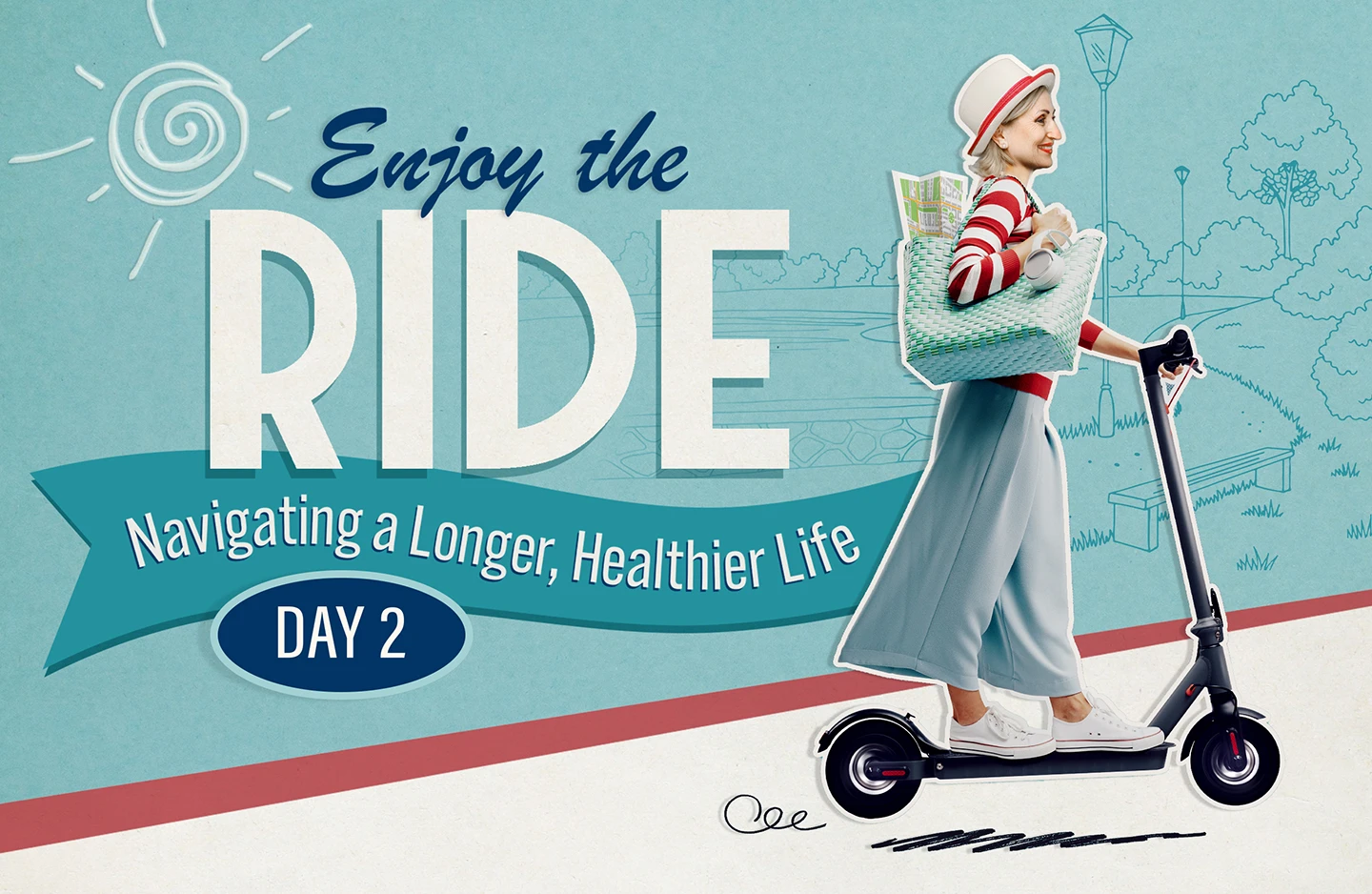
Day 2: A Roadmap to Cognitive Health
We have GPS now, but we still wouldn’t hit the road without knowing where we’re going, how long the trip will be or who will drive.
When it comes to longevity, the brain is in the driver’s seat. It navigates decision-making, learning, spatial reasoning, movement, language, emotions and our five senses. Additionally, it controls functions we don’t consciously think about, such as our sleep-wake cycle, breathing, heart rate and digestion.
The smoother your brain operates, the further you can go in terms of lifespan (years) and healthspan (wellness). This is why focusing on cognitive health—our ability to think, learn and remember clearly—is such an important aspect of longevity.
If you have a family history of dementia or Alzheimer’s, you may already be worried about what kind of driver your mind is going to be down the road or how you can remain independent.
It’s good to start your brain health journey now because most people’s brains decline in volume and weight by 5% per decade after they turn 40. That downhill drive gets steeper at 70. This reduction in cognitive function can manifest in various ways, such as difficulty recalling words, remembering people’s names, problems multitasking and reduced reaction time.
And cognitive diseases such as Alzheimer’s cause even more widespread damage than natural aging.
Currently, 7 million Americans are living with Alzheimer’s—an irreversible, progressive condition that causes memory loss, confusion and a decline in cognitive skills. The disease is the fifth-leading cause of death in people over 65 and is projected to increase to 13 million cases by 2050.
The good news is you don’t have to drive through the health hazard ahead. There’s still time to pump the brakes.

While the warning lights of degenerative brain disease may not start flashing until your 70s or 80s, recent research indicates that cognitive decline can begin decades earlier. Some early risk factors for mental disease include a family history of Alzheimer’s, depression, diabetes, hearing loss, high blood pressure, high cholesterol, obesity, poor sleep habits, a sedentary lifestyle and smoking.
Still, many people have found ways to course-correct. Studies have shown that people who work out their cognitive muscles may be 80 or 90 but maintain the brain function of a 50- or 60-year-old. They’re part of a group called “superagers” because parts of their bodies aren’t as “old” as their biological age.
Brain “youthers” like them are less likely to be on a downhill slope when it comes to memory, reasoning and problem-solving. They’re also up to 81% less likely to develop dementia or Alzheimer’s.
So, how do we keep our brains tuned up and on the road to longevity—no matter what year we came off the assembly line?
One way is to maintain your whole body’s well-being. Just as one malfunctioning part can affect a vehicle, poor health in other areas of your body could impact your brain. That’s why it’s vital to manage your blood sugar, blood pressure and cholesterol levels in addition to eating healthily, exercising and sleeping at least seven hours per night.
In addition, a healthy diet helps you maintain your memory, focus and overall cognitive performance. So, make sure your diet includes plenty of nutrient-rich options like fatty fish, berries, nuts, leafy greens and whole grains to help reduce inflammation and oxidative stress.
Studies also show that brain “superagers” learn something new daily and “cross-train” their brains by changing up their cognitive activities.
One of those activities is socializing, which we’ll explore fully tomorrow. For now, however, check out our Road Trip Checklist to learn more about cognitive-based ways to keep your brain going for miles to come.

Every day during the series, we'll share a few tips for a healthier journey. Whether you've drifted off track, need a tune-up or want to stay on course, we can help.

Getting Back on the Road
Maybe you’re having trouble getting your engine warmed up because it’s been a while since you challenged your brain. Don’t worry—you can start slow rather than rocketing down the highway. Challenge yourself by committing to a daily game like Sudoku or a crossword puzzle. You could also try listening to a podcast that can teach you new things, like Stuff You Should Know or TED Radio Hour.

Tune-Up
If you’re already an avid reader who does the Wordle every day, that’s great! Just remember that we need a change of scenery now and again because the brain needs variety (just like our physical workouts). So, consider exploring a new sport or hobby. You could also take your reading to the next gear by joining a book club. That way, you can socialize and analyze what you read in depth.

Cruise Control
All signs may point to a long, easy road ahead. You have a hobby you love, you devour books, finish puzzles daily and listen to podcasts on road trips. The question is are you stimulated or have you switched to autopilot? If you need to hit the gas, consider taking an online course, learning a new language or start playing an instrument. It may also help to find a hands-on hobby like painting, woodworking, gardening or sewing.


